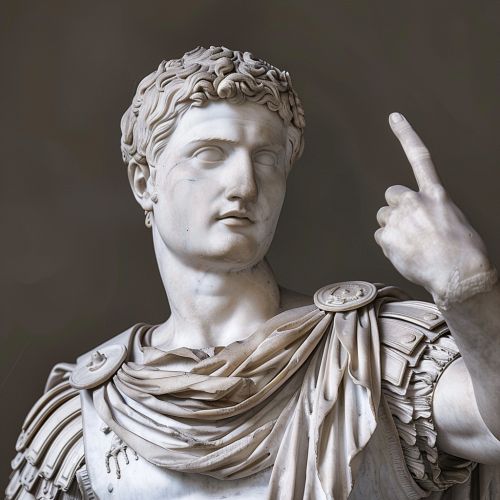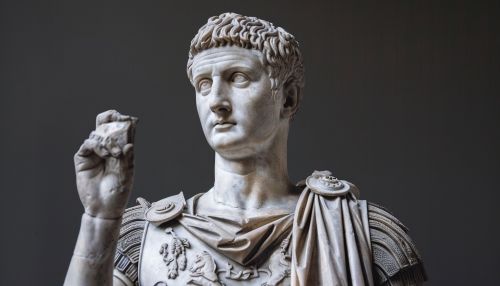Julio-Claudian Dynasty
Overview
The Julio-Claudian Dynasty was the first imperial dynasty of the Roman Empire, ruling from 27 BCE to 68 CE. This period marked the transition from the Roman Republic to the Roman Empire, characterized by the consolidation of power in the hands of a single ruler, the emperor. The dynasty is named after its two most prominent families, the Julii and the Claudii, and it includes the reigns of Augustus, Tiberius, Caligula, Claudius, and Nero. The Julio-Claudian emperors are known for their significant contributions to the Roman state, as well as their complex and often tumultuous personal lives.
Augustus (27 BCE - 14 CE)


Gaius Octavius Thurinus, known as Augustus, was the founder of the Roman Empire and its first emperor. He was born in 63 BCE and was the adopted son of Julius Caesar. Following Caesar's assassination in 44 BCE, Augustus formed the Second Triumvirate with Mark Antony and Lepidus. After defeating his rivals, Augustus established a new political order, the Principate, which maintained the facade of the Roman Republic while concentrating power in the hands of the emperor.
Augustus' reign was marked by significant administrative, military, and cultural achievements. He reformed the Roman tax system, developed networks of roads, established a standing army and the Praetorian Guard, and initiated the Pax Romana, a period of relative peace and stability across the empire. His reign also saw the flourishing of Roman literature, with figures such as Virgil, Horace, and Ovid producing some of their most famous works.
Tiberius (14 CE - 37 CE)
Tiberius Claudius Nero, known simply as Tiberius, was the stepson of Augustus and his successor. Born in 42 BCE, Tiberius was a capable military leader and administrator. His reign, however, was overshadowed by his increasing paranoia and withdrawal from public life. Tiberius' early reign was marked by successful military campaigns in Germania and the consolidation of the empire's borders.
In 26 CE, Tiberius retired to the island of Capri, leaving the administration of the empire in the hands of Sejanus, the head of the Praetorian Guard. Sejanus' ambition and subsequent downfall in 31 CE led to a period of political purges and executions. Tiberius' later years were characterized by his detachment from the affairs of state and his growing mistrust of those around him.
Caligula (37 CE - 41 CE)
Gaius Julius Caesar Augustus Germanicus, known as Caligula, was the son of the popular general Germanicus and the great-nephew of Tiberius. Born in 12 CE, Caligula's early reign was initially well-received due to his efforts to restore the political and social order disrupted by Tiberius' later years. However, his rule quickly descended into tyranny and extravagance.
Caligula is often remembered for his erratic behavior, including claims of divinity, lavish spending, and cruel punishments. His reign saw the depletion of the imperial treasury and the alienation of the Senate and the aristocracy. In 41 CE, Caligula was assassinated by members of the Praetorian Guard, leading to a brief period of chaos before the ascension of his uncle, Claudius.
Claudius (41 CE - 54 CE)
Tiberius Claudius Drusus Nero Germanicus, known as Claudius, was the first Roman emperor to be born outside Italy, in Lugdunum (modern-day Lyon, France) in 10 BCE. Despite being perceived as weak and unlikely to rule due to his physical disabilities and scholarly interests, Claudius proved to be an effective and capable ruler.
Claudius' reign was marked by significant administrative reforms, including the expansion of the Roman bureaucracy and the granting of Roman citizenship to provincial elites. He also undertook major public works projects, such as the construction of new aqueducts and the expansion of the port of Ostia. Claudius' most notable military achievement was the conquest of Britannia in 43 CE, which extended Roman control over the island.
Claudius' personal life was tumultuous, with multiple marriages and political intrigues. His fourth wife, Agrippina, was instrumental in securing the succession of her son, Nero, to the throne. Claudius died in 54 CE, possibly poisoned by Agrippina.
Nero (54 CE - 68 CE)
Nero Claudius Caesar Augustus Germanicus, known simply as Nero, was the last emperor of the Julio-Claudian dynasty. Born in 37 CE, Nero was the son of Agrippina the Younger and the great-great-grandson of Augustus. His early reign was dominated by the influence of his mother, Agrippina, and his advisors, Seneca and Burrus.
Nero's reign is often remembered for its artistic and cultural pursuits, as well as its political and social excesses. He was a patron of the arts and an accomplished musician and actor. However, his rule was also marked by increasing despotism, including the execution of his mother and his first wife, Octavia. The Great Fire of Rome in 64 CE, which destroyed much of the city, further tarnished Nero's reputation, despite his efforts to rebuild and provide relief to the victims.
Nero's later years saw a series of revolts and conspiracies against his rule, culminating in the Year of the Four Emperors in 68 CE. Facing rebellion and desertion, Nero committed suicide, marking the end of the Julio-Claudian dynasty.
Legacy
The Julio-Claudian Dynasty left a lasting impact on the Roman Empire and its subsequent history. The emperors of this dynasty established the framework for imperial rule, balancing autocratic power with the remnants of republican institutions. Their reigns saw significant military, administrative, and cultural developments that shaped the trajectory of the empire.
Despite their achievements, the Julio-Claudian emperors were also known for their personal excesses and political intrigues, which often overshadowed their contributions to the state. The dynasty's fall in 68 CE led to a period of civil war and instability, but it also paved the way for the eventual establishment of the Flavian Dynasty and the stabilization of the empire.
